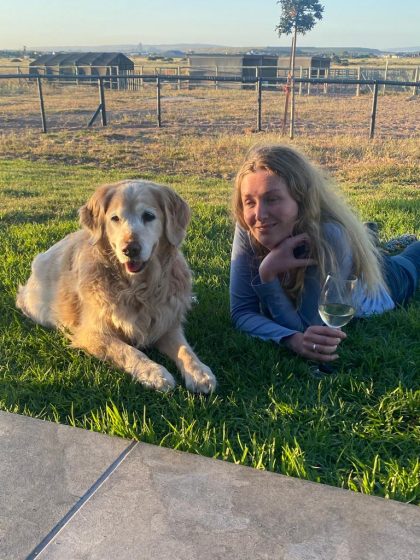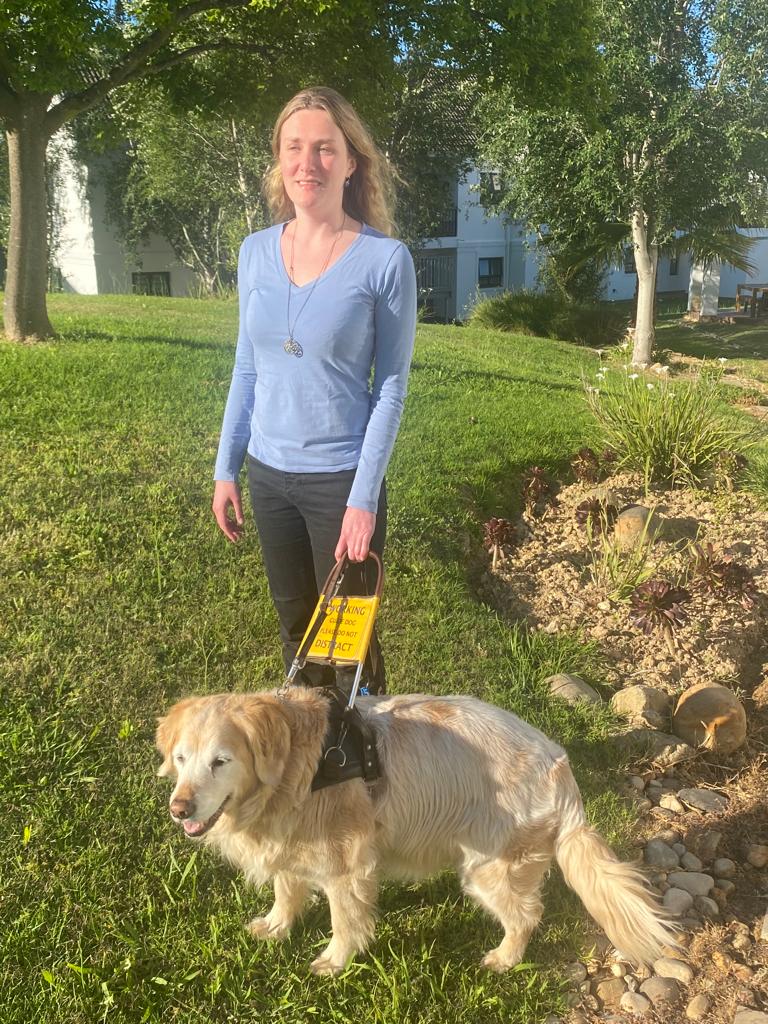This week’s article is going to address some of the frequently asked questions that I get from nondisabled people. This is more an article about me, and my specific situation, as opposed to one about disability in general. However, perhaps you can glean some insights that can be applied to other blind or otherwise disabled people.
- “How do you brush your teeth?” This is one of the more silly questions that I get, but you’d be surprised how frequently I get it. The answer is that I take my toothbrush, run some water on it, take the toothpaste tube, open it, squeeze a certain amount of toothpaste onto my toothbrush, stick the toothbrush in my mouth, and move it around so that the bristles clean my teeth. Duh! I brush my teeth like anyone else does. People don’t actually look in the mirror all the time when brushing their teeth. Why should it be a challenge for me?
- “May I pet your dog?” Yes, absolutely, as long as you ask me first, and as long as she isn’t busy working. The thing that I have a problem with is when I’m on my way somewhere (sometimes in a hurry) and someone jumps in front of me and starts petting her without even acknowledging my existence. It’s just plain rude and inconsiderate. Acknowledge the human behind the dog. Also, people seem to feel that my dog (or any dog) is public property, and they are not. Would you go up to any random pregnant woman and pat her stomach, or would you even touch someone else’s child without permission? When something like this happens, I often feel like sarcastically saying: “Oh yes, of course you may pet my dog. It’s not like I was on my way anywhere or like I have a life or anything.” Also please never call a person’s guide dog, especially not from across the street. This distracts them, and could be dangerous if they listen to you and make a beeline across a busy road. However, most times when people actually acknowledge me and ask, I will allow them to say hi to Teski and pet her.
- “How does your dog know where to go?” She doesn’t. I tell her where to go by saying “left” “right”, or “forward” combined with hand gestures. It isn’t her job to know where to go. Her job is to make sure I don’t walk into people and obstacles, fall down steps, or walk across a road without stopping. She will stop at a curb, I listen for traffic, and I tell her to go forward when I think it’s safe. She is trained to disobey me in that one command though, if she sees a car that I missed for some reason. She also becomes familiar with routes that we have often walked, so she will tend to walk familiar routes unless I tell her otherwise.
- “How much can you see?” I am classified as legally blind, and I don’t see enough to read, write, drive, or move around in an unfamiliar environment without a cane or a dog. I do have light perception, so I can usually see what time of day it is, if the sun is shining, and some things about my environment such as where there are windows. I can’t see colours, but I can distinguish different shades. I used to be able to see colours when I was a little girl, but my eye condition is deteriorating. I know what most colours look like. I just can’t tell them apart anymore by looking at them. My understanding of what colours look like are based on memory. Interestingly, the only colour that I’ve never seen (so struggle to picture) is purple. I just know that it is sort of a combination of red and blue. This has actually made it quite a special colour to me. Lastly, I can often see when there is a person in front of me, but I wouldn’t be able to see what they look like. I can see more or less depending on the lighting, and I see best when there are contrasts.
- “How did you become blind,” or “Have you been blind since birth?” The answer is that I’ve been blind since birth, and my eye condition is a genetic condition called Lebers Congenital Amaurosis (LCA). It has to do with pigmentation on the retina. Not that this is very important to me, but it is highly unlikely that any children I might have will have the condition, unless I were to have children with someone with exactly the same gene. I don’t mind telling people about my eye condition, but I would generally advise you to avoid asking someone how they became disabled as a rule, unless you know that person well. This is because some people have had highly traumatic experiences that caused their disabilities, such as perhaps having been in a terrible car accident. It can be considered to be a bit nosy as well. Also, for the love of wine, never, ever ask a disabled person anything about their toilet habits. None of your beeswax.
- “Are your other senses stronger?” No, but just as the muscle in a right-handed person’s left arm would become much stronger than might have usually been the case if they lost their right arm, my ears are trained to pick up details that others would miss. In this sense, my hearing is better than that of most sighted people.
- “How do you dream?” This is an interesting one. I obviously interpret it to mean “Do you see any differently in your dreams?” The short answer is that, in my dreams, I see as I see when I am awake. All my senses in the dream world work like my senses do in the real world. This means that completely blind people will also not see at all in their dreams. However, (and this is the interesting part) people who have lost their sight might still have dreams in which they can see. This is based on memory.
- How do you work, answer emails, make social media posts etc?” I use my phone and my computer, and they have programmes installed called screen readers. They do exactly what the name implies. They read what is on the screen, and I navigate around using the arrow keys. I never use a mouse. Aside from this, I also know braille. This is a tactile system involving six dots used in different combinations to make letters. I don’t use it often anymore, aside from when a restaurant has a braille menu, when I am making a speech or giving a talk and use notes, or when I am trying to learn a new language. Learning braille definitely had a massive impact on my ability to spell, regardless of what my mother might tell you about my spelling.
- How do you pick out your clothes?” Aside from what a clothing item physically looks like, it has other distinguishers such as the type of material, and the cut. I recognise most of my clothes, because they differ from other items in my closet. If they are of the same material and cut, but they are of different colours, I would usually ask someone which is which, or else I could arrange them in my closet in a way in which I would know, for example, that the blue dress always hangs to the left of the green one. I choose the clothing that I buy according to texture and cut, and also according to colour. I would obviously just need to be told what colours are available.
- “What is the most ableist thing anyone has ever said to you?” This one isn’t as frequently asked as the rest, but it has been asked, and I felt it was worth a mention. It is highly insulting when people tell my partners how they are incredibly good people for dating me. You know, they really are, because I’m difficult, but people usually mean it with reference to the fact that I’m disabled. I bring as much to my relationships as my partners bring, and it’s not as if they do everything for me and I am completely reliant on them. Another example (and this one is a double whammy of ableism and sexism( was the time that a guy told me that women don’t need to be as dominant as I am, then asked if I have such a dominant personality because I’m trying to compensate for my disability. It’s such a pity that I was so shocked that I only came up with a comeback half an hour later, and it was too late to say it by then. “I know you’re not a woman, but you don’t need to have such a dominant personality as a man either, so what exactly are you trying to compensate for?”
- Do you ever get sad that you’re blind?” No, I mostly don’t. There are two reasons. Firstly, I’ve been blind all my life, so as I see it, you can’t miss what you’ve never had. It is sometimes a bit distressing to me when I notice that my eye condition has deteriorated though, and I find I can’t do something easily that I could do before, or see something I used to find pretty. I also really wish I could drive. I think I would have enjoyed it, and the independence it would bring. Secondly, I am part of a disability community, and we find pride in our disabilities. I don’t see my blindness as a problem. As I’ve said before in my previous article, I see discrimination, exclusion and inaccessibility as a problem. If someone figured out a cure for my condition, I’m honestly not even completely sure that I’d go for it. It would be one hell of an adjustment, and it could possibly even be traumatising. More importantly than this though, I’m comfortable in my identity.
- “Can I pray for you?” Yeah sure, but please pray that I will experience inclusion in the situations that I encounter, or even just pray that I eventually find the right life partner, or that I one day establish a successful business and live my purpose. Don’t decide for me what I should find important. My blindness in and of itself is not an issue which I consider important. It is also not a defect, a generational curse, a sign that I just don’t have faith in being “healed”, a sign that my family is being punished by God for something, or the devil’s work. Although I am agnostic, I absolutely respect your faith, but please also respect my views on my own disability. In addition, please can we not do this out loud in public? It makes me feel like a spectacle.
- “How many fingers am I holding up?” Um, I don’t know, because I’m blind, and that means that I can’t… wait for it… see! Okay, I don’t get this question from adults (often). But parents, (although I have incredible patience for children asking questions) please teach your children about disabilities, and please teach them not to do this! It’s annoying.

